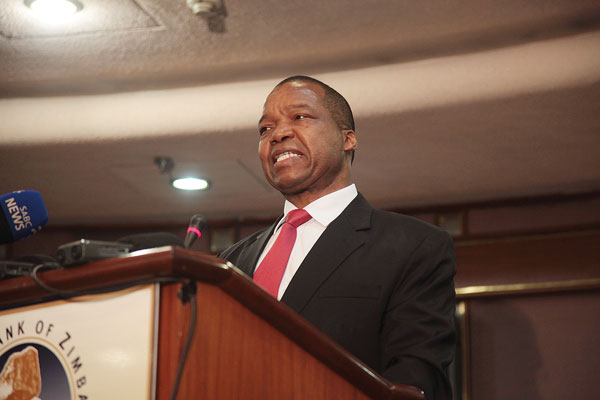
THE Reserve Bank of Zimbabwe (RBZ) has negotiated for an enhanced nostro stabilisation facility of $600 million from Afreximbank to manage the cyclical nature of Zimbabwe’s foreign exchange receipts.
BY TARISAI MANDIZHA/FIDELITY MHLANGA

Presenting his monetary policy statement yesterday, RBZ governor, John Mangudya said this facility will be available for drawdown after the end of the tobacco selling season by the end of August 2017.
“This nostro stabilisation facility shall ensure that the revival of firms is strengthened and that critical imports of fuel and electricity are assured,” he said.
Mangudya said with immediate effect, foreign exchange receipts from platinum and chrome shall be treated in the same manner as gold, diamond, tobacco and cotton in order to ensure that the nostro stabilisation facility is supported by a continuous stream of export receipts, and by so doing, improve the efficient utilisation of foreign exchange and bring equity in the forex market.
He rapped banks for failing to account for $2,1 billion made in foreign payments from January to June 30, 2017.
Of the total $2,96 billion received in foreign payments, Mangudya said only $850 million was channelled towards fuel, electricity and raw materials and the balance of $2,1 billion was used by the banks.
“In line with the current foreign exchange management framework, $2,1 billion was utilised for various foreign payments through banks,” he said.
- Chamisa under fire over US$120K donation
- Mavhunga puts DeMbare into Chibuku quarterfinals
- Pension funds bet on Cabora Bassa oilfields
- Councils defy govt fire tender directive
Keep Reading
“The balance of $887 million (30%) was received and administered by the Reserve Bank through the foreign exchange management system.”
Mangudya said the central bank has engaged banks and they were aware of the anomaly.
“Not all banks received foreign currency, only six banks, as currently not all banks have exporting customers,” he said.
“The banks say they have used the foreign currency efficiently, but where even there is a shortage, it breeds arbitrage.
“Sometimes we don’t have proof, but some of the money will be given to those who can pay.”
Mangudya, however, said he did not have evidence to prove that $2,1 billion was not properly utilised by the banking sector, adding that the prevailing foreign currency shortages were a result of market indiscipline.
The RBZ boss said following the maturity and full settlement of the $200 million initial African Export-Import Bank trade backed securities (Aftrades) on February 13, 2017, the bank has renewed the facility, with $400 million expected over the next two years to mature in 2019.
Already, more than 75% of this amount has been subscribed.
Mangudya said individuals were now permitted to carry $2 000 when they leave the country.
Previously, there was confusion with a statutory instrument saying a person could only carry $1 000, while the law permitted up to $5 000.
The bank said with effect from September 1, 2017 it will establish a portfolio investment fund to facilitate for the efficient repatriation of money to foreign investors mainly on the Zimbabwe Stock Exchange, with an initial amount of $5 million.











